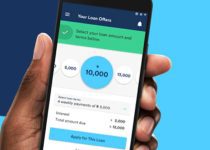How To Get ₦50,000 to ₦5Million Business Loan in Nigeria For Your Small or Medium Business
If you own a small or medium business in Nigeria, you may be wondering how to get the funding you need to expand. Fortunately, there are many business loan options available for Nigerian entrepreneurs.
In this blog post, we’ll discuss how you can access loans of between ₦50,000 and ₦5Million for your small or medium business. We’ll explain the different types of loans available, and how to apply for them. With the right guidance and preparation, you could secure the funding you need to grow your business.
Table of Contents
Banks
One of the most common places to look for a business loan in Nigeria is a bank. Banks offer different types of business loans to support entrepreneurs, small and medium enterprises (SMEs), and large businesses.
Some banks even have specialized departments to handle business loans.
The advantages of getting a loan from a bank include access to a large amount of capital, fixed interest rates, and longer repayment terms. However, banks also have stringent requirements, which may make it difficult for some businesses to qualify.
It is important to note that some banks require collateral or a personal guarantee before approving a loan. Therefore, it is important to carefully consider the terms of the loan and the potential risks before accepting an offer from a bank.
To get started, research the different types of business loans available from various banks in Nigeria. This will help you understand the criteria required for each type of loan and help you choose the most appropriate one for your business needs.
Microfinance banks
If you are a small or medium-sized business owner in Nigeria, you may have heard of microfinance banks. These banks offer financial services to low-income individuals, micro-enterprises, and small businesses that may not qualify for loans from traditional banks.
Microfinance banks offer loans to businesses with varying interest rates and repayment periods. The loans are usually small, ranging from ₦50,000 to ₦1 million, making them ideal for small and medium-sized businesses in need of short-term funding.
Unlike traditional banks, microfinance banks offer their loans without requiring collateral. Instead, they evaluate the creditworthiness of the borrower based on their financial history, income, and business plan.
Microfinance banks are often a popular choice for businesses that do not have the necessary credit history or assets required for traditional bank loans. Additionally, microfinance banks may provide business development services to their clients, such as financial literacy training, business planning, and mentorship.
To apply for a loan from a microfinance bank, you will need to provide the necessary documents and meet their criteria for loan approval. Some of these requirements include having a viable business plan, providing proof of income and financial stability, and being registered with the Corporate Affairs Commission (CAC).
Before deciding on a microfinance bank, it is essential to research and compare different options to find the one that offers the best interest rates, repayment terms, and business development services.
Overall, microfinance banks offer a great alternative for small and medium-sized businesses looking to secure short-term funding without the requirements of traditional banks.
Government Programs
In addition to traditional banks and microfinance banks, there are also government programs in Nigeria that offer business loans to small and medium-sized enterprises. These programs are often designed to support the growth of the local economy and promote job creation.
One popular program is the Central Bank of Nigeria’s (CBN) Anchor Borrowers’ Program, which provides loans to farmers and agribusinesses. The program aims to boost agricultural production and reduce Nigeria’s dependence on imported food.
Another program is the Bank of Industry’s Youth Entrepreneurship Support (YES) Program, which provides funding and business training to young entrepreneurs. To qualify for these programs, there are usually specific criteria that businesses must meet. For example, the Anchor Borrowers’ Program requires that applicants be practicing farmers who are members of a cooperative society or farmers’ association.
The YES Program, on the other hand, is open to entrepreneurs between the ages of 18 and 35 who have a viable business idea.
To apply for a government business loan, you will typically need to provide the same documents as for a traditional loan, including financial statements and a business plan. However, there may be additional requirements specific to each program.
Be sure to carefully review the eligibility criteria and application process before applying.
When preparing your business plan and pitch to lenders, it is important to highlight how your business aligns with the goals of the government program you are applying to.
For example, if you are applying for an agricultural loan, you may want to emphasize how your farm will help increase food production in Nigeria and create jobs for local communities.
Some of the top government programs offering business loans in Nigeria include the CBN’s Anchor Borrowers’ Program, the Bank of Industry’s YES Program, and the Federal Government’s MSME Survival Fund. Be sure to explore all your options and find the program that best fits your business’s needs.
Also, when taking out a government business loan, it is important to have a clear repayment plan in place. Make sure you understand the terms of the loan and have a realistic plan for paying it back. Remember that successful loan repayment can help improve your business’s credit score and make it easier to secure financing in the future.
Criteria To Qualify For a Business Loan
When applying for a business loan in Nigeria, there are certain criteria you must meet to be eligible for consideration. Financial institutions need to ensure that they are lending to a reliable and trustworthy borrower who has a high chance of repaying the loan.
Here are some of the criteria that you must meet to qualify for a business loan:
- Business registration: You must have a registered business with the Corporate Affairs Commission (CAC) in Nigeria. This shows that your business is a legal entity that can enter into contracts and borrow money.
- Credit score: Financial institutions will check your credit score to assess your creditworthiness. A good credit score shows that you have a history of paying back loans on time. If you have a poor credit score, it may be difficult to secure a business loan.
- Financial records: You need to have a good financial track record. This includes your business bank account statement, profit and loss statement, balance sheet, and cash flow statement. These records will show the lender how much money your business is making and how much it is spending.
- Collateral: Some lenders may require collateral to secure the loan. This is an asset that the lender can seize if you default on the loan. Common collateral includes property, vehicles, and equipment.
- Business plan: You must have a clear business plan that outlines your business objectives, strategy, marketing plan, and financial projections. This will show the lender that you have a solid plan for growing your business and repaying the loan.
Meeting these criteria will increase your chances of qualifying for a business loan. It is important to note that different lenders may have their own unique requirements, so it is essential to check with them beforehand.
Documents Needed To Apply For a Business Loan
When you’re ready to apply for a business loan in Nigeria, it’s important to have all the necessary documents in order. These documents help lenders to assess your financial situation and determine whether you qualify for a loan.
Here are some of the documents you will need when applying for a business loan:
- Personal identification: You will need a valid form of identification, such as a driver’s license or passport.
- Business registration documents: These documents include your business registration certificate, tax identification number (TIN), and any other relevant licenses and permits.
- Financial statements: Lenders will want to see your business’s financial statements, including income statements, balance sheets, and cash flow statements.
- Business plan: You should have a well-written business plan that includes your company’s mission statement, market analysis, financial projections, and other relevant details.
- Collateral: Depending on the type of loan you’re applying for, you may need to provide collateral such as property or assets to secure the loan.
- Bank statements: Lenders will want to see your business’s bank statements to assess your cash flow and financial stability.
- References: You may be asked to provide references from clients, suppliers, or other business partners to vouch for your business’s reliability and credibility.
Having these documents prepared ahead of time will help speed up the loan application process and increase your chances of approval. It’s also a good idea to work with a financial advisor or consultant who can guide you through the application process and ensure that you’re providing all the necessary information.
How To Prepare Your Business Plan And Pitch to Lenders
Before applying for a business loan, it’s important to have a solid business plan in place and be able to present it in a clear and convincing manner to potential lenders. Here are some steps to help you prepare your business plan and pitch:
- Identify your target market: Define your customer base and identify your competitors. Show how your product or service is unique and fills a gap in the market.
- Develop a financial plan: This should include a sales forecast, cash flow projections, and profit and loss statements. Be realistic in your projections and include contingencies for unforeseen events.
- Describe your management team: Lenders want to see that your business is being led by competent individuals with experience and skills relevant to the industry.
- Explain how you will use the loan: Be specific about how you plan to invest the funds and how it will help your business grow. This will help the lender see how the loan will be repaid.
- Practice your pitch: Before presenting your business plan, practice your pitch to friends or family members to get feedback. This will help you refine your message and identify any weaknesses in your pitch.
- Be prepared to answer questions: Lenders may have questions about your business plan and financial projections. Be ready to provide detailed answers and address any concerns they may have.
Remember, the purpose of your business plan and pitch is to convince lenders that your business is a good investment. Take the time to prepare a compelling pitch and be prepared to address any concerns or questions they may have.
FAQS
How much can I borrow from FairMoney for the first time?
FairMoney offers loans ranging from ₦1,500 to ₦500,000. The specific loan amount you can borrow as a first-time borrower will depend on various factors, including your creditworthiness, income level, and repayment history with FairMoney.
Who can help me with money urgently in Nigeria?
There are various financial institutions and online lending platforms in Nigeria that can provide quick access to funds. Some popular options include FairMoney, Carbon, Renmoney, Palmcredit, and QuickCheck. It is important to compare interest rates, terms, and eligibility criteria to find the best option that suits your needs.
How to apply for Baobab loan?
To apply for a loan from Baobab, you can visit their official website or download their mobile app. Fill out the loan application form, providing accurate and complete information about yourself and your financial situation. Baobab will assess your application and inform you of the loan amount, interest rate, and repayment terms if approved.
Where can I get a loan of 20 million Naira?
Obtaining a loan of 20 million Naira typically requires approaching commercial banks or specialized financial institutions that cater to large-scale business financing. You may need to provide collateral, have a solid credit history, and meet stringent eligibility criteria. It is recommended to contact major banks or engage the services of a financial advisor for personalized assistance.
What is the highest amount in FairMoney loan?
FairMoney offers loans up to a maximum of ₦500,000. However, the specific loan amount you can qualify for will depend on your creditworthiness, income level, and repayment history with FairMoney. It is important to note that loan approval and maximum loan amounts are subject to the lender’s evaluation and criteria.
Conclusion
In conclusion, securing a business loan in Nigeria can be a daunting task, but with the right knowledge and approach, you can successfully get the financial support you need to grow your business. Remember to consider the various financial institutions offering business loans in Nigeria and compare their interest rates, repayment plans, and other terms before making a decision.
Additionally, ensure you meet the criteria for a business loan and have all the necessary documents to make your application process smoother. Lastly, creating a solid business plan and pitch is crucial to convince lenders of the potential profitability of your business and increase your chances of getting approved.
With these tips, you can navigate the process of securing a business loan and take your small or medium enterprise to the next level




